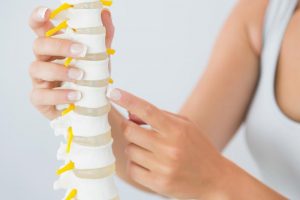 Herniated Discs May or May Not Cause Pain
Herniated Discs May or May Not Cause Pain
Spongy, intervertebral discs prevent vertebrae from grinding against each other and facilitate movement of the spine. When something forces the the soft, middle portion of a disc to rupture through the annulus fibrosus (the outer ring of the disc), a herniation occurs. It may or may not cause pain, depending on whether nerve tissue is irritated by the rupture.
Herniated (“slipped”) discs typically affect discs located between the fourth and fifth lower back vertebrae because this area bears the full weight of the upper body during all activities. The most common reason for suffering a herniated disc is aging, followed by incorrect lifting of heavy objects (i.e. using back muscles instead of thigh and leg musles). If a herniation is severe, you may feel shooting pain into your buttocks and thighs due to irritation of the sciatic nerve. An extremely serious herniation causing intense pain, weakness in the legs and incontinence is called cauda equina syndrome.
Bulging Discs May Lead to Herniated Discs
Bulging discs extend outward from between vertebrae but haven’t ruptured because the exterior layer of cartilage remains intact. Also a part of aging, bulging discs occur primarily in the lower back if a disc shifts out of alignment and bulges through a crack in the spine. If you have a bulging disc but it doesn’t rupture, you may never know you have one unless your doctor orders an MRI to examine a secondary condition.
Are Pinched Nerves Really Pinched?
Millions of nerves extend from your spinal cord to the brain, constantly sending messages regarding external and internal stimuli. If nerves become compressed, or “pinched”, your brain receives strong, unrelenting pain signals. Causes of pinched nerves include stress from repetitive motions, holding your body in certain positions for extended periods or herniated discs. Untreated pinched nerves may lead to a diagnosis of tennis elbow, peripheral neuropathy or carpal tunnel syndrome.
Have you ever thought you might have a herniated disc or pinched nerve?
